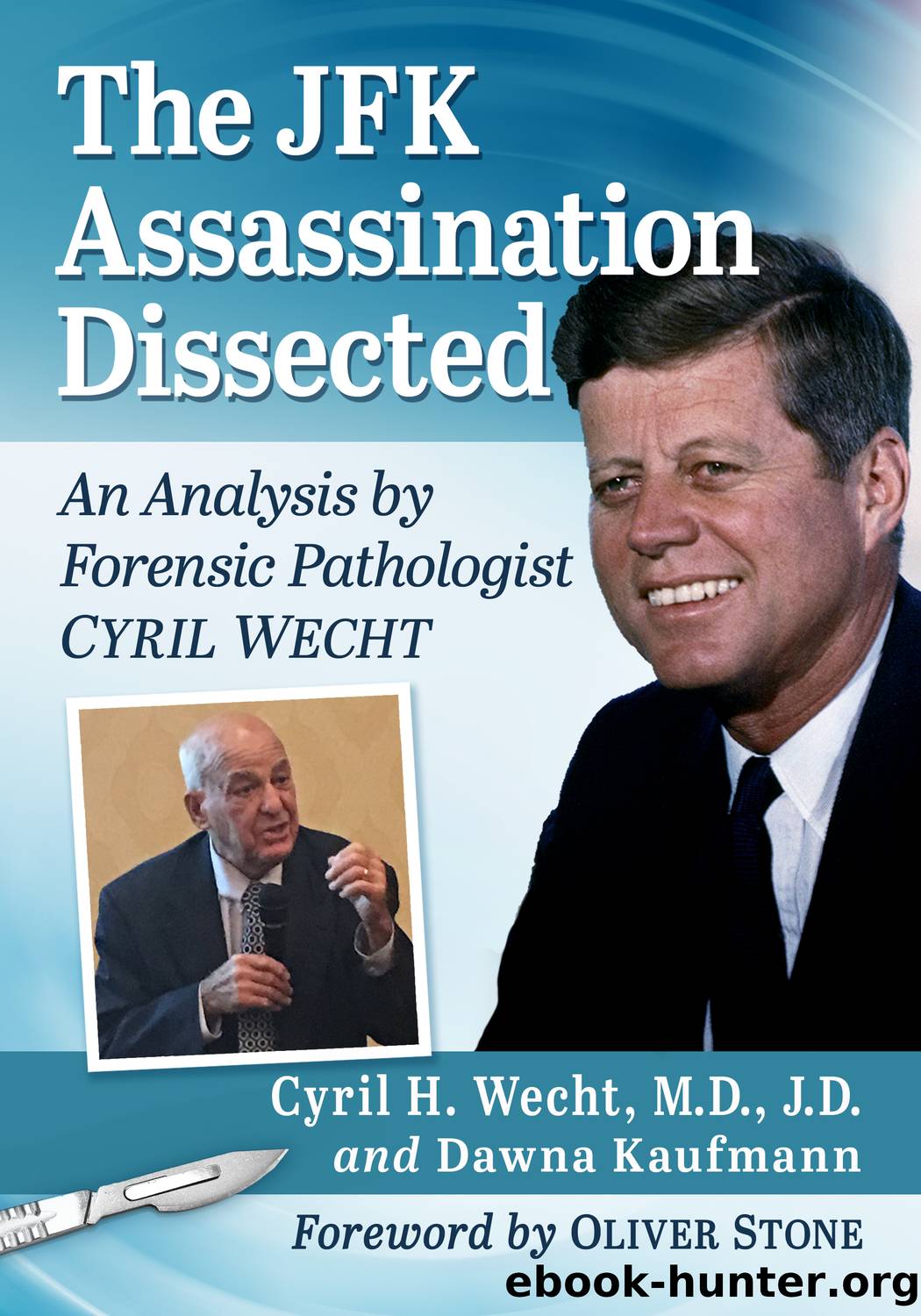The JFK Assassination Dissected by Cyril H. Wecht M.D. J.D.;Dawna Kaufmann;

Author:Cyril H. Wecht, M.D., J.D.;Dawna Kaufmann;
Language: eng
Format: epub
Publisher: McFarland & Company, Inc.
Published: 2021-11-08T00:00:00+00:00
Assassination Nation
After JFKâs assassination, President Johnson expanded upon programs estab- lished by his predecessor from civil rights to space exploration, but the next few years were brutal for him. Health crises took their toll, including a weak heart and surgeries to remove a kidney stone and his gallbladder. And with some 70,000 Americans killed or wounded in Vietnam and public sentiment turning against the war, Johnson announced in March 1968 that he would not serve another term as president. He retired to his Texas ranch where he died at age 64 on January 22, 1973. He and his wife, Lady Bird, who died in 2007, are buried in the Johnson Family Cemetery in Stonewall, Texas. Richard Nixon won the election to replace Johnson, with Maryland Governor Spiro T. Agnew as his vice president. The Republican takeover in 1969 wasnât a smooth transition. Agnewâs views on policy matters rankled Nixon, and charges surfaced that the vice president had issues of financial chicanery and tax evasion. As Nixon was gearing up to run for reelection in 1972, he considered replacing Agnew with John Connally, now treasury secretary, but Nixon stuck with his veep, and they beat their Democratic challengers. In 1973, Agnew accepted a plea bargain to avoid jail time and, on October 9, resigned from office. On December 6, Nixon appointed his new vice president: the House minority leader and congressman from Michigan, Gerald Ford, who had served on the Warren Commission.
The Vietnam War continued until 1975, but the â70s were also rife with domestic turbulence. On June 18, 1972, five men were arrested for breaking into the Democratic National Committee headquarters at the Watergate Office Building in Washington, D.C. For the next several months, the Âmind-boggling investigation into the menâs ties to the Nixon administration unfolded, culminating in televised hearings before the U.S. Senate. The public learned that President Nixon had approved plans to pay for and cover up the burglarsâ activities, and the House of Representatives began an impeachment process against Nixon for obstruction of justice, abuse of power, and contempt of Congress. The scandal resulted in the indictments of 69 individuals, with 48 convictions, including top administration officials. Among those who received prison sentences were ÂexâFBI agent G. Gordon Liddy and former CIA officer E. Howard Hunt, who had recruited some of the burglars from secret antiâCastro operations he had conducted. Before the impeachment came up for a vote from the full House, and because it was believed there were enough votes in the Senate to convict, Nixon resigned from office on August 9, 1974. Congress dropped the proceedings, and Vice President Gerald Ford was sworn in as president. In a controversial move weeks later, Ford pardoned Nixon. Our government is built upon enduring friendships, with the players protecting and rewarding each other.
In addition to President Kennedyâs slaying in November 1963 and that of civil rights activist Medgar Evers the previous June, the 1960s brought two other political assassinations in America. The Rev. Martin Luther King, Jr., was
Download
This site does not store any files on its server. We only index and link to content provided by other sites. Please contact the content providers to delete copyright contents if any and email us, we'll remove relevant links or contents immediately.
| Espionage | Hoaxes & Deceptions |
| Murder & Mayhem | Organized Crime |
| Serial Killers | White Collar Crime |
Mindhunter: Inside the FBI's Elite Serial Crime Unit by John E. Douglas & Mark Olshaker(8667)
Wiseguy by Nicholas Pileggi(5293)
Hitman by Howie Carr(4802)
Room 212 by Kate Stewart(4718)
Secrecy World by Jake Bernstein(4358)
Killers of the Flower Moon: The Osage Murders and the Birth of the FBI by David Grann(4161)
Breaking Free by Rachel Jeffs(3995)
Papillon (English) by Henri Charrière(3886)
Killers of the Flower Moon by David Grann(3731)
Say Nothing by Patrick Radden Keefe(3701)
American Kingpin by Nick Bilton(3490)
The Secret Barrister by The Secret Barrister(3407)
Molly's Game: From Hollywood's Elite to Wall Street's Billionaire Boys Club, My High-Stakes Adventure in the World of Underground Poker by Molly Bloom(3322)
Mysteries by Colin Wilson(3243)
In Cold Blood by Truman Capote(3124)
I'll Be Gone in the Dark by Michelle McNamara(2878)
Signature in the Cell: DNA and the Evidence for Intelligent Design by Stephen C. Meyer(2869)
Rogue Trader by Leeson Nick(2815)
Bunk by Kevin Young(2799)
